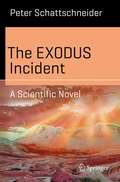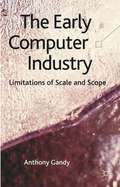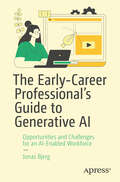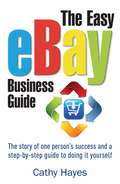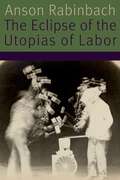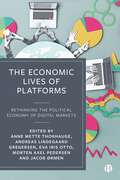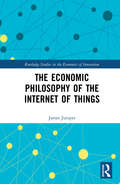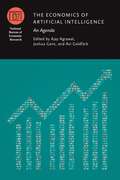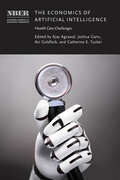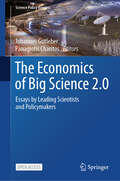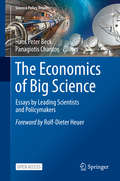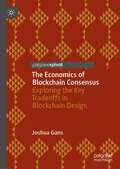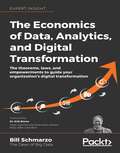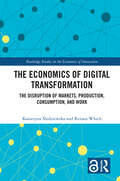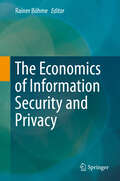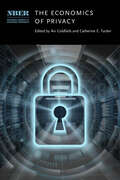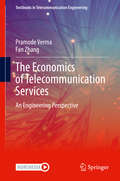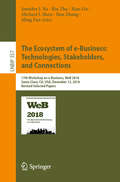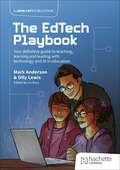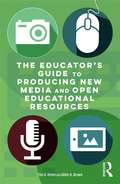- Table View
- List View
The EXODUS Incident: A Scientific Novel (Science and Fiction)
by Peter SchattschneiderIn the near future, Earth is suffering from climate change, famines, and fundamentalism. A global nuclear war is imminent. Interstellar probes from the Breakthrough Starshot project initiated by J. Milner and S. Hawking have discovered a habitable planet in the stellar system Proxima Centauri, just in time for the exodus of the elites. On board the EXODUS starship, the crew starts to experience strange things. The voyage to Atlantis, the new home for mankind, enters a mysterious and disquieting territory, where conspiracy theories about what is real and what is virtual emerge. THE EXODUS INCIDENT is a novel about an interstellar journey, which connects science to virtual realities and epistemology. In the guise of a final investigative report, a scientific treatise discusses the physics and mathematics behind the story: the starship, the fusion thruster, the target planet, and the journey, addressing anomalous effects which involve relativistic speed and deep space environments.
The Early Computer Industry
by Anthony GandyUses case studies to explore why large scale electronics failed to win a leadership position in the early computer industry and why IBM, a firm with a heritage in the business machines industry, succeeded. The cases cover both the US and the UK industry focusing on electronics giants GE, RCA, English Electric, EMI and Ferranti.
The Early-Career Professional’s Guide to Generative AI: Opportunities and Challenges for an AI-Enabled Workforce
by Jonas BjergThe world stands at a pivotal moment due to the emergence of Generative AI, specifically ChatGPT. This groundbreaking technology has provoked and impressed almost every industry globally, evoking every emotion from awe to anxiety. Many are apprehensive about the future, fearing job losses due to rapid artificial intelligence (AI advancements). But if history has taught us anything, progress, while challenging, often paves the way for broader opportunities and growth. This book explains in depth the core building blocks that make up the current landscape of transformer and language models and, more broadly speaking, AI as a whole. We have seen how the internet and the mobile revolution changed our world. Is AI following a similar trajectory? Are we on the verge of something even more transformative? This book strives to provide a complete picture of the challenges and opportunities and the implications for our shared futures. In subsequent chapters, the book will discuss language models in depth. These are not just algorithms; they represent a nexus of linguistics, cognitive science, and cutting-edge technology. You’ll trace AI’s unexpected and exhilarating evolution, observing how it has grown from a mere concept to a force reshaping entire industries. Finally, you’ll consider the rise of AI in the context of advancements. While ChatGPT has gained significant attention for certain applications, it’s essential to recognize that its capabilities extend far beyond what’s immediately evident. Artificial Intelligence, represented by models like ChatGPT, is not a static field. It’s dynamic and ever-evolving, and its potential applications are broadening each day. Technology is not, by any means, limited to chatbots or translation use cases. This book captures this vast and ever-expanding horizon of possibilities. What You Will Learn How large language models came to be, and how they work What ethical AI design looks like The role of regulation in artificial intelligence Why you should not be afraid of losing your job Who This Book is For Working professionals and students in any field
The Easy eBay Business Guide: The Story Of One Person's Success And A Step-by-step Guide To Doing It Yourself
by Cathy HayesFrom a few bits and pieces in a dusty loft to a profitable business with more than 20,000 sales and turnover of £100,000.00 in just one year. This book not only tells the story of how the author went from being an eBay buyer to a Top Rated Platinum Powerseller with over 12,000 positive feedbacks, but also provides the reader with a step by step easy to follow guide to launching a successful eBay business. Drawing from the Author's own experiences and skills acquired in her first year trading this book will help the reader avoid the pitfalls and mistakes she made and fast track their new enterprise on the road to success.
The Easy eBay Business Guide: The story of one person's success and a step-by-step guide to doing it yourself
by Cathy HayesFrom a few bits and pieces in a dusty loft to a profitable business with more than 20,000 sales and turnover of £100,000.00 in just one year. This book not only tells the story of how the author went from being an eBay buyer to a Top Rated Platinum Powerseller with over 12,000 positive feedbacks, but also provides the reader with a step by step easy to follow guide to launching a successful eBay business. Drawing from the Author's own experiences and skills acquired in her first year trading this book will help the reader avoid the pitfalls and mistakes she made and fast track their new enterprise on the road to success.
The Eclipse of the Utopias of Labor (Forms of Living)
by Anson RabinbachThe Eclipse of the Utopias of Labor traces the shift from the eighteenth-century concept of man as machine to the late twentieth-century notion of digital organisms. Step by step—from Jacques de Vaucanson and his Digesting Duck, through Karl Marx’s Capital, Hermann von Helmholtz’s social thermodynamics, Albert Speer’s Beauty of Labor program in Nazi Germany, and on to the post-Fordist workplace, Rabinbach shows how society, the body, and labor utopias dreamt up future societies and worked to bring them about. This masterful follow-up to The Human Motor, Rabinbach’s brilliant study of the European science of work, bridges intellectual history, labor history, and the history of the body. It shows the intellectual and policy reasons as to how a utopia of the body as motor won wide acceptance and moved beyond the “man as machine” model before tracing its steep decline after 1945—and along with it the eclipse of the great hopes that a more efficient workplace could provide the basis of a new, more socially satisfactory society.
The Economic Lives of Platforms: Rethinking the Political Economy of Digital Markets
by Anne Mette Thorhauge, Andreas Lindegaard Gregersen, Eva Iris Otto, Jacob Ørmen and Morten Axel PedersenThis interdisciplinary collection rethinks the political economy of the digital market by asking what came before platforms and suggesting what might come after them. By unpacking the concept of ‘platform economies’ into locally embedded variations of digital markets, the book identifies what is new about contemporary platforms and what is characteristic of wider historical, social and economic currents. The diverse team of authors employ various analytical approaches, including in-depth ethnographic studies, and theoretical and analytical reconceptualizations of platforms and the industries they encompass.Tapping into current themes including the decolonisation of the internet, this book offers a timely assessment of the implications of emerging reconfigurations between technology, information, society and markets.
The Economic Philosophy of the Internet of Things (Routledge Studies in the Economics of Innovation)
by James JuniperTo properly understand the nature of the digital economy we need to investigate the phenomenon of a "ubiquitous computing system" (UCS). As defined by Robin Milner, this notion implies the following characteristics: (i) it will continually make decisions hitherto made by us; (ii) it will be vast, maybe 100 times today’s systems; (iii) it must continually adapt, on-line, to new requirements; and, (iv) individual UCSs will interact with one another. This book argues that neoclassical approaches to modelling economic behaviour based on optimal control by "representative-agents" are ill-suited to a world typified by concurrency, decentralized control, and interaction. To this end, it argues for the development of new, process-based approaches to analysis, modelling, and simulation. The book provides the context—both philosophical and mathematical—for the construction and application of new, rigorous, and meaningful analytical tools. In terms of social theory, it adopts a Post-Cognitivist approach, the elements of which include the nature philosophy of Schelling, Marx’s critique of political economy, Peircean Pragmatism, Whitehead’s process philosophy, and Merleau-Ponty’s phenomenology of the flesh, along with cognitive scientific notions of embodied cognition and neural Darwinism, as well as more questionable notions of artificial intelligence that are encompassed by the rubric of "perception-and-action-without-intelligence".
The Economics of Artificial Intelligence: An Agenda (National Bureau of Economic Research Conference Report)
by Ajay Agrawal, Joshua Gans, and Avi GoldfarbAdvances in artificial intelligence (AI) highlight the potential of this technology to affect productivity, growth, inequality, market power, innovation, and employment. This volume seeks to set the agenda for economic research on the impact of AI. It covers four broad themes: AI as a general purpose technology; the relationships between AI, growth, jobs, and inequality; regulatory responses to changes brought on by AI; and the effects of AI on the way economic research is conducted. It explores the economic influence of machine learning, the branch of computational statistics that has driven much of the recent excitement around AI, as well as the economic impact of robotics and automation and the potential economic consequences of a still-hypothetical artificial general intelligence. The volume provides frameworks for understanding the economic impact of AI and identifies a number of open research questions. Contributors: Daron Acemoglu, Massachusetts Institute of Technology Philippe Aghion, Collège de France Ajay Agrawal, University of Toronto Susan Athey, Stanford University James Bessen, Boston University School of Law Erik Brynjolfsson, MIT Sloan School of Management Colin F. Camerer, California Institute of Technology Judith Chevalier, Yale School of Management Iain M. Cockburn, Boston University Tyler Cowen, George Mason University Jason Furman, Harvard Kennedy School Patrick Francois, University of British Columbia Alberto Galasso, University of Toronto Joshua Gans, University of Toronto Avi Goldfarb, University of Toronto Austan Goolsbee, University of Chicago Booth School of Business Rebecca Henderson, Harvard Business School Ginger Zhe Jin, University of Maryland Benjamin F. Jones, Northwestern University Charles I. Jones, Stanford University Daniel Kahneman, Princeton University Anton Korinek, Johns Hopkins University Mara Lederman, University of Toronto Hong Luo, Harvard Business School John McHale, National University of Ireland Paul R. Milgrom, Stanford University Matthew Mitchell, University of Toronto Alexander Oettl, Georgia Institute of Technology Andrea Prat, Columbia Business School Manav Raj, New York University Pascual Restrepo, Boston University Daniel Rock, MIT Sloan School of Management Jeffrey D. Sachs, Columbia University Robert Seamans, New York University Scott Stern, MIT Sloan School of Management Betsey Stevenson, University of Michigan Joseph E. Stiglitz. Columbia University Chad Syverson, University of Chicago Booth School of Business Matt Taddy, University of Chicago Booth School of Business Steven Tadelis, University of California, Berkeley Manuel Trajtenberg, Tel Aviv University Daniel Trefler, University of Toronto Catherine Tucker, MIT Sloan School of Management Hal Varian, University of California, Berkeley
The Economics of Artificial Intelligence: Health Care Challenges (National Bureau of Economic Research Conference Report)
by Ajay Agrawal, Joshua Gans, Avi Goldfarb, and Catherine E. TuckerA timely investigation of the potential economic effects, both realized and unrealized, of artificial intelligence within the United States healthcare system. In sweeping conversations about the impact of artificial intelligence on many sectors of the economy, healthcare has received relatively little attention. Yet it seems unlikely that an industry that represents nearly one-fifth of the economy could escape the efficiency and cost-driven disruptions of AI. The Economics of Artificial Intelligence: Health Care Challenges brings together contributions from health economists, physicians, philosophers, and scholars in law, public health, and machine learning to identify the primary barriers to entry of AI in the healthcare sector. Across original papers and in wide-ranging responses, the contributors analyze barriers of four types: incentives, management, data availability, and regulation. They also suggest that AI has the potential to improve outcomes and lower costs. Understanding both the benefits of and barriers to AI adoption is essential for designing policies that will affect the evolution of the healthcare system.
The Economics of Big Science 2.0: Essays by Leading Scientists and Policymakers (Science Policy Reports)
by Panagiotis Charitos Johannes GutleberThe second volume of open access essays builds upon the success of the initial installment, "The Economics of Big Science (© 2021, 978-3-030-52390-9, Open Access book as well)," delving deeper into the tangible socio-economic value generated by fundamental science missions and elucidating the various ways in which this benefit is realized. This collection showcases contributions that stem from socio-economic impact studies conducted on the activities of Research Infrastructures. These studies were presented and discussed by the authors during a dedicated session on the "Economics of Big Science" at the headquarters of the European Space Agency (ESA) in Paris in May 2023, organized by EIROforum. The authors, affiliated with prominent universities, research centers, and international research organizations, actively contribute to an international collaborative effort. Their aim is to develop strategies and policies that ensure fundamental scientific research in Europe translates into tangible and sustainable societal and economic benefits. This volume is intended to be a valuable resource for policymakers, funding agencies, scientists, and academics across diverse domains. It serves as a comprehensive reference for the evidence of socio-economic impact stemming from fundamental scientific research within Open Science, Research, and Innovation environments. Moreover, it equips stakeholders with evidence supporting the effectiveness of impact analysis and facilitates the design of best practices in this regard.
The Economics of Big Science: Essays by Leading Scientists and Policymakers (Science Policy Reports)
by Hans Peter Beck Panagiotis CharitosThe essays in this open access volume identify the key ingredients for success in capitalizing on public investments in scientific projects and the development of large-scale research infrastructures.Investment in science – whether in education and training or through public funding for developing new research tools and technologies – is a crucial priority. Authors from big research laboratories/organizations, funding agencies and academia discuss how investing in science can produce societal benefits as well as identifying future challenges for scientists and policy makers. The volume cites different ways to assess the socio-economic impact of Research Infrastructures and their role as hubs of global collaboration, creativity and innovation. It highlights the different benefits stemming from fundamental research at the local, national and global level, while also inviting us to rethink the notion of “benefit” in the 21st century.Public investment is required to maintain the pace of technological and scientific advancements over the next decades. Far from advocating a radical transformation and massive expansion in funding, the authors suggest ways for maintaining a strong foundation of science and research to ensure that we continue to benefit from the outputs. The volume draws inspiration from the first “Economics of Big Science” workshop, held in Brussels in 2019 with the aim of creating a new space for dialogue and interaction between representatives of Big Science organizations, policy makers and academia. It aspires to provide useful reading for policy makers, scientists and students of science, who are increasingly called upon to explain the value of fundamental research and adopt the language and logic of economics when engaging in policy discussions.
The Economics of Blockchain Consensus: Exploring the Key Tradeoffs in Blockchain Design
by Joshua GansBlockchain technologies have been rapidly adopted for the creation of cryptocurrencies and have been explored for a myriad of applications. While this is of important economic interest, the computer science behind how blockchains operate to provide security and provenance has been largely inaccessible to economists. This book is a bridge between the computer science and the economics of blockchains. The focus is on the value and the achievement of blockchain consensus; that is, how distributed and independent nodes are able to reach an agreement on what the current state of digital ledgers, that are the product of blockchains, are. The book shows that the goals of computer scientists in designing blockchains place very high weight on security beyond what an economist trained in game theory and mechanism design would require. It shows how blockchains can be redesigned to account for key economic trade-offs, and will be of interest to researchers and students of economics, financial technology and computer science, alongside policymakers.
The Economics of Data, Analytics, and Digital Transformation: The theorems, laws, and empowerments to guide your organization's digital transformation
by Bill Schmarzo Dr. Kirk BorneBuild a continuously learning and adapting organization that can extract increasing levels of business, customer and operational value from the amalgamation of data and advanced analytics such as AI and Machine LearningKey FeaturesMaster the Big Data Business Model Maturity Index methodology to transition to a value-driven organizational mindsetAcquire implementable knowledge on digital transformation through 8 practical lawsExplore the economics behind digital assets (data and analytics) that appreciate in value when constructed and deployed correctlyBook DescriptionIn today's digital era, every organization has data, but just possessing enormous amounts of data is not a sufficient market discriminator.The Economics of Data, Analytics, and Digital Transformation aims to provide actionable insights into the real market discriminators, including an organization's data-fueled analytics products that inspire innovation, deliver insights, help make practical decisions, generate value, and produce mission success for the enterprise.The book begins by first building your mindset to be value-driven and introducing the Big Data Business Model Maturity Index, its maturity index phases, and how to navigate the index. You will explore value engineering, where you will learn how to identify key business initiatives, stakeholders, advanced analytics, data sources, and instrumentation strategies that are essential to data science success. The book will help you accelerate and optimize your company's operations through AI and machine learning.By the end of the book, you will have the tools and techniques to drive your organization's digital transformation.Here are a few words from Dr. Kirk Borne, Data Scientist and Executive Advisor at Booz Allen Hamilton, about the book:Data analytics should first and foremost be about action and value. Consequently, the great value of this book is that it seeks to be actionable. It offers a dynamic progression of purpose-driven ignition points that you can act upon.What you will learnTrain your organization to transition from being data-driven to being value-drivenNavigate and master the big data business model maturity indexLearn a methodology for determining the economic value of your data and analyticsUnderstand how AI and machine learning can create analytics assets that appreciate in value the more that they are usedBecome aware of digital transformation misconceptions and pitfallsCreate empowered and dynamic teams that fuel your organization's digital transformationWho this book is forThis book is designed to benefit everyone from students who aspire to study the economic fundamentals behind data and digital transformation to established business leaders and professionals who want to learn how to leverage data and analytics to accelerate their business careers.
The Economics of Digital Transformation: The Disruption of Markets, Production, Consumption, and Work (Routledge Studies in the Economics of Innovation)
by Katarzyna Śledziewska Renata WłochThe unprecedented Covid-19 crisis revealed the scale and scope of a new type of economy taking shape in front of our very eyes: the digital economy. This book presents a concise theoretical and conceptual framework for a more nuanced analysis of the economic and sociological impacts of the technological disruption that is taking place in the markets of goods and services, labour markets, and the global economy more generally. This interdisciplinary work is a must for researchers and students from economics, business, and other social science majors who seek an overview of the main digital economy concepts and research. Its down-to-earth approach and communicative style will also speak to businesses practitioners who want to understand the ongoing digital disruption of the market rules and emergence of the new digital business models. The book refers to academic insights from economics and sociology while giving numerous empirical examples drawn from basic and applied research and business. It addresses several burning issues: how are digital processes transforming traditional business models? Does intelligent automation threaten our jobs? Are we reaching the end of globalisation as we know it? How can we best prepare ourselves and our children for the digitally transformed world? The book will help the reader gain a better understanding of the mechanisms behind the digital transformation, something that is essential in order to not only reap the plentiful opportunities being created by the digital economy but also to avoid its many pitfalls.
The Economics of Information Security and Privacy
by Rainer BöhmeIn the late 1990s, researchers began to grasp that the roots of many information security failures can be better explained with the language of economics than by pointing to instances of technical flaws. This led to a thriving new interdisciplinary research field combining economic and engineering insights, measurement approaches and methodologies to ask fundamental questions concerning the viability of a free and open information society. While economics and information security comprise the nucleus of an academic movement that quickly drew the attention of thinktanks, industry, and governments, the field has expanded to surrounding areas such as management of information security, privacy, and, more recently, cybercrime, all studied from an interdisciplinary angle by combining methods from microeconomics, econometrics, qualitative social sciences, behavioral sciences, and experimental economics. This book is structured in four parts, reflecting the main areas: management of information security, economics of information security, economics of privacy, and economics of cybercrime. Each individual contribution documents, discusses, and advances the state of the art concerning its specific research questions. It will be of value to academics and practitioners in the related fields.
The Economics of Information Technology
by Joseph Farrell Hal R. Varian Carl ShapiroThe Economics of Information Technology is a concise and accessible review of some of the important economic factors affecting information technology industries. These industries are characterized by high fixed costs and low marginal costs of production, large switching costs for users, and strong network effects. These factors combine to produce some unique behavior. The book consists of two parts. In the first part, Professor Varian outlines the basic economics of these industries. In the second part, Professors Farrell and Shapiro describe the impact of these factors on competition policy. The clarity of the analysis and exposition makes this an ideal introduction for undergraduate and graduate students in economics, business strategy, law and related areas.
The Economics of Network Industries
by Oz ShyThis book introduces upper-level undergraduates, graduate students, and researchers to the latest developments in network economics, one of the fastest-growing fields in all industrial organization. Network industries include the Internet, e-mail, telephony, computer hardware and software, music and video players, and service operations in the banking, legal, and airlines industries among many others. The work offers an overview of the subject matter as well as investigations about specific industries. It conveys the essential features of how strategic interactions between firms are affected by network activity, as well as covering social interaction and its influence on consumers' choices of products and services. Virtually no calculus is used in the text, and each chapter ends with a series of exercises and selected references. The text may be used for both one- and two-semester courses.
The Economics of Privacy (National Bureau of Economic Research Conference Report)
by Avi Goldfarb and Catherine E. TuckerA foundational new collection examining the mechanics of privacy in the digital age. The falling costs of collecting, storing, and processing data have allowed firms and governments to improve their products and services, but have also created databases with detailed individual-level data that raise privacy concerns. This volume summarizes the research on the economics of privacy and identifies open questions on the value of privacy, the roles of property rights and markets for privacy and data, the relationship between privacy and inequality, and the political economy of privacy regulation. Several themes emerge across the chapters. One is that it may not be possible to solve privacy concerns by creating a market for the right to privacy, even if property rights are well-defined and transaction costs are low. Another is that it is difficult to measure and value the benefits of privacy, particularly when individuals have an intrinsic preference for privacy. Most previous attempts at valuation have focused only on quantifiable economic outcomes, such as innovation. Finally, defining privacy through an economic lens is challenging. The broader academic and legal literature includes many distinct definitions of privacy, and different definitions may be appropriate in different contexts. The chapters explore a variety of frameworks for examining these questions and provide a range of new perspectives on the role of economics research in understanding the benefits and costs of privacy and of data flows. As the digital economy continues to expand the scope of economic theory and research, The Economics of Privacy provides the most comprehensive survey to date of this field and its next steps.
The Economics of Telecommunication Services: An Engineering Perspective (Textbooks in Telecommunication Engineering)
by Fan Zhang Pramode VermaThis textbook characterizes the economics of telecommunication services from an engineering perspective. The authors bring out the fundamental drivers of the industry and characterize networks from a graph theoretic perspective, including random, small world, and scale free networks. The authors relate the topology of a telecommunication network using circuit and packet switched architectures to throughput and other performance parameters. The pricing model proposed in this book is based on the cost of displaced opportunity as opposed to the cost of the elements of the network engaged in delivering a service. The displaced opportunity is characterized by the revenue associated with the service that the network could have alternatively delivered most efficiently using an identical level of resources. The book addresses other topics such as regulation in legacy networks, and net neutrality. Finally, the book introduces the application of game theory in a multi-vendor, multi-services competitive marketplace. The book aims to bridge the gap between the science of economics as practiced by economists and practice of pricing from a telecommunication engineer’s perspective. This book is suitable for use by senior undergraduate or graduate students of telecommunication engineering or researchers and practitioners in telecommunication engineering.
The Ecosystem of e-Business: 17th Workshop on e-Business, WeB 2018, Santa Clara, CA, USA, December 12, 2018, Revised Selected Papers (Lecture Notes in Business Information Processing #357)
by Xiao Liu Han Zhang Michael J. Shaw Ming Fan Jennifer J. Xu Bin ZhuThis book constitutes revised selected papers from the 17th Workshop on e-Business, WeB 2018, which took place in Santa Clara, CA, USA, in December 2018. The purpose of WeB is to provide an open forum for e-Business researchers and practitioners world-wide, to share topical research findings, explore novel ideas, discuss success stories and lessons learned, map out major challenges, and collectively chart future directions for e-Business. The WeB 2018 theme was “The Ecosystem of e-Business: Technologies, Stakeholders, and Connections.”There was a total of 47 submissions and 41 papers were presented at the conference. Of these, 19 revised papers are presented in this volume. These contributions are organized in the following topical sections: social, policy, and privacy issues; e-market; FinTech; and artificial intelligence.
The EdTech Playbook: Your Definitive Guide to Teaching, Learning and Leading with Technology and AI in Education
by Mark Anderson Olly LewisThe EdTech Playbook is your go-to guide to using EdTech in evidence-informed ways to help you work smarter, transform your teaching and enrich students' learning.Whether you're an experienced educator or newly qualified, this book is packed with practical strategies and real-life examples from fellow teachers you can benefit from. Learn about:- expert advice from experienced authors who know what works- powerful case studies showcasing how educators at all levels use technology to make a difference- time-saving tips to reclaim your precious time- how to leverage AI to support your teaching and their learning- workable ideas to bring light into your everyday teaching practice- how to support digital transformation at scale- the importance of online safety and the role of safeguarding and data privacy in EdTech.The EdTech Playbook is your roadmap to increasing not just your knowledge and skills, but also your creativity in how you apply technology in the classroom. Dive in and become the tech-savvy educator you've always dreamed of being!
The EdTech Playbook: Your Definitive Guide to Teaching, Learning and Leading with Technology and AI in Education
by Mark Anderson Olly LewisThe EdTech Playbook is your go-to guide to using EdTech in evidence-informed ways to help you work smarter, transform your teaching and enrich students' learning.Whether you're an experienced educator or newly qualified, this book is packed with practical strategies and real-life examples from fellow teachers you can benefit from. Learn about:- expert advice from experienced authors who know what works- powerful case studies showcasing how educators at all levels use technology to make a difference- time-saving tips to reclaim your precious time- how to leverage AI to support your teaching and their learning- workable ideas to bring light into your everyday teaching practice- how to support digital transformation at scale- the importance of online safety and the role of safeguarding and data privacy in EdTech.The EdTech Playbook is your roadmap to increasing not just your knowledge and skills, but also your creativity in how you apply technology in the classroom. Dive in and become the tech-savvy educator you've always dreamed of being!
The Education of a Photographer
by Steven Heller Charles TraubIdeal for art students at every level Illuminating words about creating great images Published in association with New York's School of Visual Arts. What does it mean to become a photographer in the twenty-first century? This thoughtful collection of essays illuminates the spirit of the people who make the indelible images of our times. Aspiring and professional photographers-especially those in arts programs throughout the United States-will appreciate the comprehensive vision of The Education of a Photographer. Classic writings from the twentieth century as well as the thoughts of the most influential talents working today, plus essays from designers, editors, and gallery owners, make this a compelling look at what drives and inspires photographers to create great work.
The Educator's Guide to Producing New Media and Open Educational Resources
by Abbie H. Brown Tim D. GreenDigital video, audio, and text have never been more popular, and educators need to know how to make new media work in all types of learning environments. The Educator’s Guide to Producing New Media and Open Educational Resources provides practical advice on how to produce and use open access resources to support student learning. This realistic "how-to" guide is written for education professionals in any discipline seeking to transform their instruction with technology.
